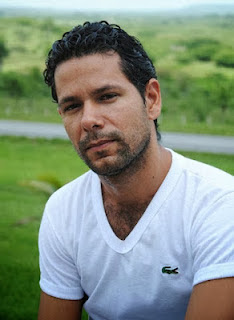"Whoever destroys a single life is considered by Scripture to have destroyed the whole world, and whoever saves a single life is considered by Scripture to have saved the whole world." - Mishnah (1135-1204)
 |
| Harold Cepero Escalante (1980 - 2012) |
Harold Cepero Escalante was born in Ciego de Avila on January 29, 1980 and was murdered by the Cuban dictatorship together with Oswaldo Payá Sardiñas in Bayamo, Granma on July 22, 2012. Harold was a member of the Christian Liberation Movement and a youth leader. Harold understood that those who engaged in repression were also not free stating "[t]hose who remove and crush freedom are the real slaves."
T @MichelCespedesR
— Center for a Free Cuba (@cubacenter) January 29, 2022
Harold Cepero Escalante
(El Bala)
Chambas, Ciego de Ávila
January 29, 1980
Bayamo, Granma
July 22, 2012 #Cuba
Christian Liberation Movement
Murdered by the tyranny together with Oswaldo Payá https://t.co/2ZhJf0GBXl
Today would have been his 42nd birthday, but due to the actions of the Castro regime's secret police his life was ended ten years ago at the age of 32.
MT @mclcubaoficial Eliecer Porto, Christian Liberation Movement in Palma Soriano, remembers Harold Cepero on his birthday, January 29, 1980. Harold Cepero was murdered along with Oswaldo Payá by the Cuban communist regime on July 22, 2012 https://t.co/WmJT7KB1HT
— Center for a Free Cuba (@cubacenter) January 29, 2022
Clare Short, a former Labor member of parliament addressing the topic of forgiveness and justice raises two important points that underline reconciliation within an ongoing injustice and repression:
"Is anger about injustice one of the forces that drives historical progress and important social reform? Is there an important difference between the bitterness,hatred and quest for vengeance that can be so damaging to those who have been hurt or wronged, and the anger that thirsts after justice?" ... "I also agree that the quest for vengeance is also wrong because it so often inflicts harm on people who share an identity with the original perpetrator but have no guilt,and it means the evil of the original harm is recreated in the actions of the person who has been wronged. But all this said, there is such a thing as just anger and those who are subject to continuing oppression can get strength from that anger in order to join with others to liberate themselves. And so I wish to conclude by celebrating forgiveness and reconciliation but also by reminding us that reconciliation can not be the answer when there is a continuing wrong or continuing oppression."
In the Cuban context, Antonio "Tony" Ramón Díaz Sánchez, a former prisoner of conscience and secretary general of the Christian Liberation Movement, rejects hatred while at the same time forgiving past injustices
but refuses to forgive those that are ongoing or that will
be carried out in the future. Because to forgive ongoing and future evils raises the danger of one becoming morally complicit in them or as Tony puts it:
"Because what I do not forgive is that the year has started with the same repression that ended last year. What I can not forgive is that in my country, those who govern, do not recognize the need to change to democracy and allow the people to decide in free and pluralistic elections. I can not and do not want to forgive that right now, at this instant, there are political prisoners in Cuba and that the existing laws guarantee their imprisonment or perhaps the firing squad for others. I do not forgive that young people are living without life projects, while a group in power live as billionaires. Nor do I forgive the complicity of many interests that seek capital now in Cuba without wanting to find out today what is happening there. I do not forgive out of hate. No, no but because forgiving a present and a future of injustice and totalitarianism for your country, is not mercy but complicity with the evil of others."
Tony Díaz Sánchez understood, and continues to understand the dangers of speaking truth to power in Cuba, and paid the price of long years in prison, and forced exile to do it.
Harold also understood the dangers of advocating for freedom in Cuba under the Castro dictatorship. In 2012, shortly before his death he explained the cost of resistance:
"Christians and non-Christians who have the courage and the freedom to consider the peaceful political option for their lives, know they are exposing themselves to slightly less than absolute solitude, to work exclusion, to persecution, to prison or death."
This courageous young man is remembered and the demand for justice continues. The petition demanding an international investigation into the circumstances of Harold and Oswaldo's killing on July 22, 2012 has crossed 16,500 signatures.
Defending memory by pursuing truth and maintaining the call for justice is an ever present opportunity for the other to repent and embrace justice and actual forgiveness. The antithesis of this is "forgiving and forgetting" while injustices are ongoing and new ones being compounded not only harms the victims but also condemns the perpetrator to continue committing evil acts and is described as a "false reconciliation."
In the spirit of defending truth and memory, this video of a 2002 interview with Harold Cepero provided by the Christian Liberation Movement on their Youtube channel is being shared.





No comments:
Post a Comment